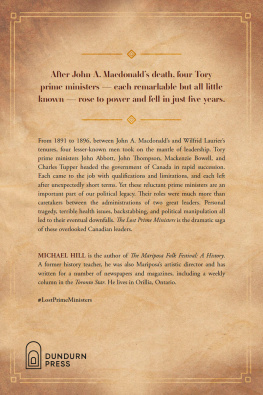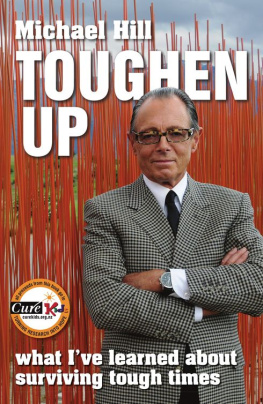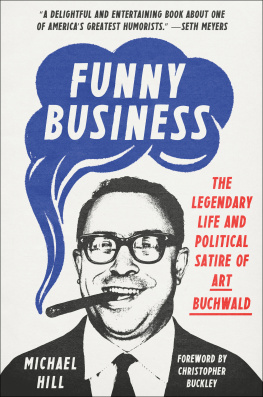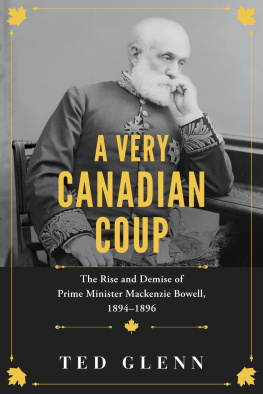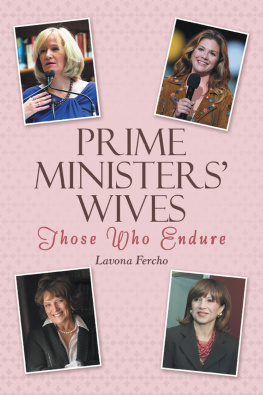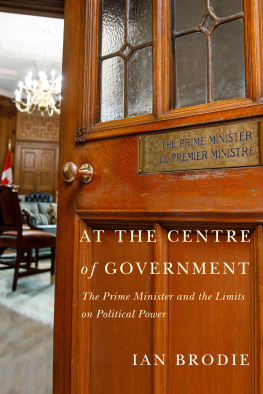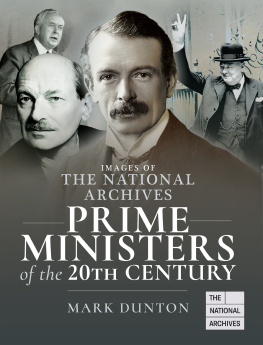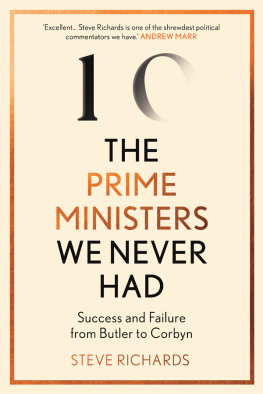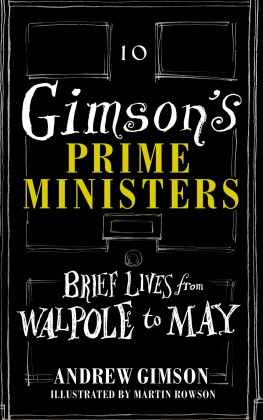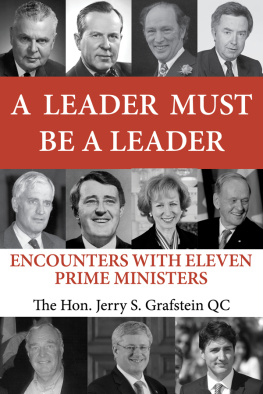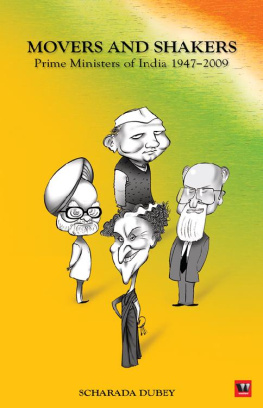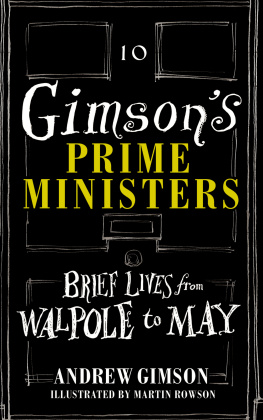Contents
Guide
ACKNOWLEDGEMENTS

It may seem a bit odd to acknowledge people from my distant past for a book that was written in 2020. Yet I believe it was my teachers, almost as much as my parents, who sparked a love of history early in my life. I recall my elementary teachers Mrs. Mumford and Mr. March, who taught me about Marco Polo, Pierre Radisson, and even made Lord Durham interesting. In high school, it was Mr. John Palmer who fostered an intellectual approach to history. He could make historical figures like Plato, Metternich, and Garibaldi almost come alive. I then was lucky enough to study history at York University in the early seventies under such wonderful professors as Ramsay Cook, Jack Granatstein, and Paul Stevens. Thank you to all those inspiring teachers.
Thanks again to the staff of Dundurn Press. Their patience, guidance, and support cannot be underestimated. In particular, thanks to associate publisher Kathryn Lane and to my editor, Dominic Farrell, for their acceptance and help in bringing this project into being.
Finally, thanks to my wife, Bonnie, and to my daughters, Erin and Stephanie, for their support and enthusiasm for this book.
ABOUT THE AUTHOR

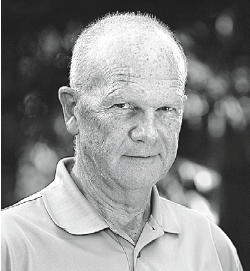
Photo courtesy of Ron Hill
MICHAEL HILL IS A GRADUATE of York University and the University of Toronto. He is the author of The Mariposa Folk Festival: A History. Michaels articles and book reviews have appeared in numerous publications. He wrote a weekly column for the Toronto Star for over thirty years and taught elementary school in both Toronto and Orillia. After retiring, he was the artistic director of the Mariposa Folk Festival and is currently the president of Stephen Leacock Associates, which awards the annual Leacock Medal for Humour. His interests outside of reading, writing, and history include golf, art, and music. Michael has two daughters and four grandchildren and lives in Orillia with his wife, Bonnie, and his dog, Rocky.
SELECTED BIBLIOGRAPHY

Abbott, Elizabeth. The Reluctant PM: Notes on the Life of Sir John Abbott, Canadas Third Prime Minister. Montreal: self-published, 1997.
Bliss, Michael. Right Honourable Men: The Descent of Politics from Macdonald to Mulroney. Toronto: Harper Collins, 1994.
Bowering, George. Stone Country: An Unauthorized History of Canada. Toronto: Penguin Canada, 2003.
Creighton, Donald. John A. Macdonald: The Old Chieftain. Toronto: Macmillan, 1955.
_____. John A. Macdonald: The Young Politician. Toronto: Macmillan, 1952.
_____. The Road to Confederation: The Emergence of the Canadas, 18631867. Toronto: Macmillan, 1964.
Durant, Vincent. War Horse of Cumberland: The Life and Times of Sir Charles Tupper. Hantsport, N.S.: Lancelot Press, 1985.
Granatstein, J.L., and Norman Hilmer. Prime Ministers: Ranking Canadas Leaders. Toronto: Harper Collins, 1999.
Gwyn, Richard. John A: The Man Who Made Us. Toronto: Random House, 2008.
_____. Nation Maker: Sir John A. Macdonald: His Life, Our Times. Toronto: Random House, 2011.
Hopkins, J.C. Life and Work of the Rt. Hon. Sir John Thompson: Prime Minister of Canada. Toronto: United Publishing Houses, 1895.
Longley, J.W. Sir Charles Tupper. Makers of Canada, Vol. 1. Toronto: Morang & Company, 1916.
Pennington, Christopher. The Destiny of Canada: Macdonald, Laurier and the Election of 1891. The History of Canada. Toronto: Allan Lane, 2011.
Pope, Joseph. The Day of Sir John Macdonald: A Chronicle of the First Prime Minister of the Dominion. Toronto: Glasgow, Brook & Company, 1915.
_____. Memoirs of the Right Honourable Sir John Alexander Macdonald. Volume 1 Ottawa: J. Durie & Son, 1894.
Saunders, E.M., ed. The Life and Letters of the Rt. Hon. Sir Charles Tupper, BART., K.C.M.G. Vol. II. Toronto: Cassell and Company, 1916.
Smith, Cynthia M., and Jack McLeod. Sir John A. An Anecdotal Life of John A. Macdonald. Toronto: Oxford University Press, 1989.
Waite, P.B. Macdonald: His Life and World. Toronto: McGraw-Hill-Ryerson, 1975.
_____. The Man from Halifax: Sir John Thompson, Prime Minister. Toronto: University of Toronto Press, 1985.
Other Publications
Colquhoun, A.H.U. Civil Service Reform. Canadian Magazine, MayOct. 1896: 56971.
Simpson, Jeffrey. The Perils of Presentism. Queens Quarterly 125, no. 2 (Summer 2018): 25265.
Waite, P.B. Love in Code. Canadas History. Canadas History Society. Posted February 14, 2017. canadashistory.ca/explore/prime-ministers/love-in-code.
Other Sources
Canada Guide. thecanadaguide.com
Dictionary of Canadian Biography. biographi.ca/en/index.php
Laurentian Heritage WebMagazine. laurentian.quebecheritageweb.com
Library and Archives Canada. bac-lac.gc.ca/eng/Pages/home.aspx
Chapter One

The Legacy of
Sir John A. Macdonald
TO PROPERLY EVALUATE THE MINISTRIES of Abbott, Thompson, Bowell, and Tupper, it is necessary to first look at the life and career of the man who set the tone for the future prime ministers of Canada. John A. Macdonald invented the job. He accomplished great things. He was brilliant in many ways. He made a number of horrendous mistakes as well. In normal circumstances, those who followed him would have been asked to build on his accomplishments and clean up the messes he left behind. However, the four prime ministers who briefly held office after Macdonalds death did not have the time to properly do so. Each tried, and their efforts are worth considering.

The story of Sir John A. Macdonald has been well-told in outstanding books by historians and authors such as Donald Creighton, P.B. Waite, Richard Gwyn, and Pierre Berton. Volume One of Gwyns two-part biography is appropriately titled John A: The Man Who Made Us. Most Canadians are able to recite at least some accomplishment of our first prime minister. His rugged and unique face, having graced the ten-dollar bill for decades, is familiar to the nation. The myths especially in regard to his fondness for alcohol have been told and re-told to Canadians many times. He was a complex man, one with both admirable qualities and unlikeable biases. There is no doubt about his contributions to this country.
In the nineteenth century, no politician dominated his countrys public affairs more than Macdonald. His stature was on a par with Abraham Lincoln and Benjamin Disraeli in that regard. He was the first world leader to advocate for women getting the vote. He was accepting of French Canadians and Roman Catholics at a time when bigotry and prejudice controlled many levers of political office. He famously said of the English-French dichotomy in Canada, Treat them [the French] as a nation and they will act as a free people generally do generously. Treat them as a faction and they will become fractious. Friendships, such as those he had with Georges-tienne Cartier and Hector Langevin, were not merely out of political expediency to cement the French-English relationships in government. They were based on genuine rapport. He also welcomed immigration to Canada, although admittedly most of those he foresaw entering the country were of English, Scots, or Irish stock.

